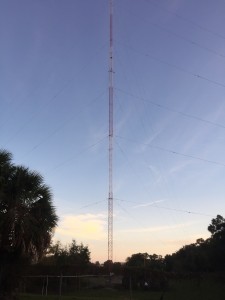
In light of his legal opinion that the radio tower violates Florida Statutes, the City of Pensacola Land Development Code and its Comprehensive Plan, Inweekly asked attorney John Asmar for a second legal opinion on the validity of the 2012 lease agreement with Divine Communication and the building permits issued by the city for the new radio tower. (Read Long Hollow Opinion).
Edward Fleming, the attorney for Divine Communication, has argued that his client had to tear down the old radio tower and replace it because the lease obligated that he do it. His client had no other option, according to Fleming.
The fundamental question is:
Could the City of Pensacola enter into an agreement that required a party to perform an illegal act, which, in this case, was building a new, larger radio tower in a area where such structures and uses are prohibited?
Based on his prior legal research and conclusions, Asmar wrote in his second opinion that lease agreement and any subsequent building permits were acts contrary to Florida Statutes, the City of Pensacola Land Development Code and its Comprehensive Plan.
Florida law prohibits a municipality to exercise its power in violation of the Florida Constitution, Florida Statutes, and its ordinances. Therefore, the City of Pensacola lacked the authority to execute the lease and issue building permits for a new tower in the Long Hollow Conservation District.
“According to Florida Law and Florida case law, the City’s actions were ultra vires acts and therefore, null and void,†wrote the attorney. “The subject tower should be removed.â€
Black’s Law Dictionary defines an “ultra vires act” as one that is “unauthorized; beyond the scope of power allowed or granted by corporate charter or law.”
According to Asmar, Chapter 163 of Florida Statutes requires that all development approved by the City be consistent with the City’s Comprehensive Plan and Land Development Code. In his legal opinion, the lease and building permits were not consistent with either and, thus, were not permitted or authorized by Florida law.
He cited the case of Town of Lauderdale-by-the-Sea v. Meretsky (Fla. 4th DCA 2000).
Meretsky sought to build an enclosure around a pool and needed a variance on the required setback from the property line. In his application, he did not mention the wall would encroach on the Town’s right-of-way by 10 feet, but the map with the application showed it. The Town Commission approved the setback variance, and a building permit was issued.
At some point, the Town Commission directed its administration to halt the construction. Despite the issuance of a cease and desist order, the wall was completed.
Meretsky sought a declaratory judgment finding the building permit valid. During the appeal, the Town argued Town Commission did not have the authority to grant the building permit for a wall on the public right-of-way as its construction violated the Town’s Code of Ordinances.
Due to the Town’s authorizing an act contrary to its ordinances, the Appellate Court voided the building permit, and the part of the wall on the right-of-way had to be removed.
How does this case apply to the Divine lease and subsequent building permits?
In May 2012, the Pensacola City Council approved the lease but it was not informed by the city administrator that radio towers are non-conforming use and structures in the Conservation District. The council did not have the authority to grant a variance from the Comprehensive Plan for Divine to build a new, taller radio tower in that district. The council could not waive its Land Development Code, Comprehensive Plan and Florida Statutes. The vote was a ultra vires act, based on Asmar’s legal opinion.
“Like the holding in Lauderdale-by-the-Sea, whether by mistake or misrepresentation, when the City of Pensacola’s City Council approved the subject lease in 2012, the City Council did not have all the facts and unknowingly approved the subject lease and authorized the construction of the tower in violation of Florida Statutes, the City’s Plan and the City’s LDC,” wrote Asmar. “Further like Lauderdale-by-the-Sea, the City’s errant approval and construction authorization cannot be construed as an adoption of an ordinance amending the City’s LDC to allow for the same.”
He added, “Since the City authorized an act contrary to its own ordinances, the City’s approval was ultra vires and void. Lastly, like the holding in Lauderdale-by-the-Sea, the City of Pensacola is not estopped from enforcing its ordinances and revoking the permits issued to or on behalf of Divine World Radio, Inc. which had been obtained in violation of the City’s Plan and City’s LDC.”
According to his legal opinion, “when there is no authority to grant the permit, the City cannot be estopped from revoking the permit. Therefore, the City is not estopped from requiring the subject tower to be removed.”
Read his full opinion: Lease Validity.
—–
The answer to the fundamental question posed is “No.” What will Mayor Ashton Hayward and the Pensacola City Council do about it?